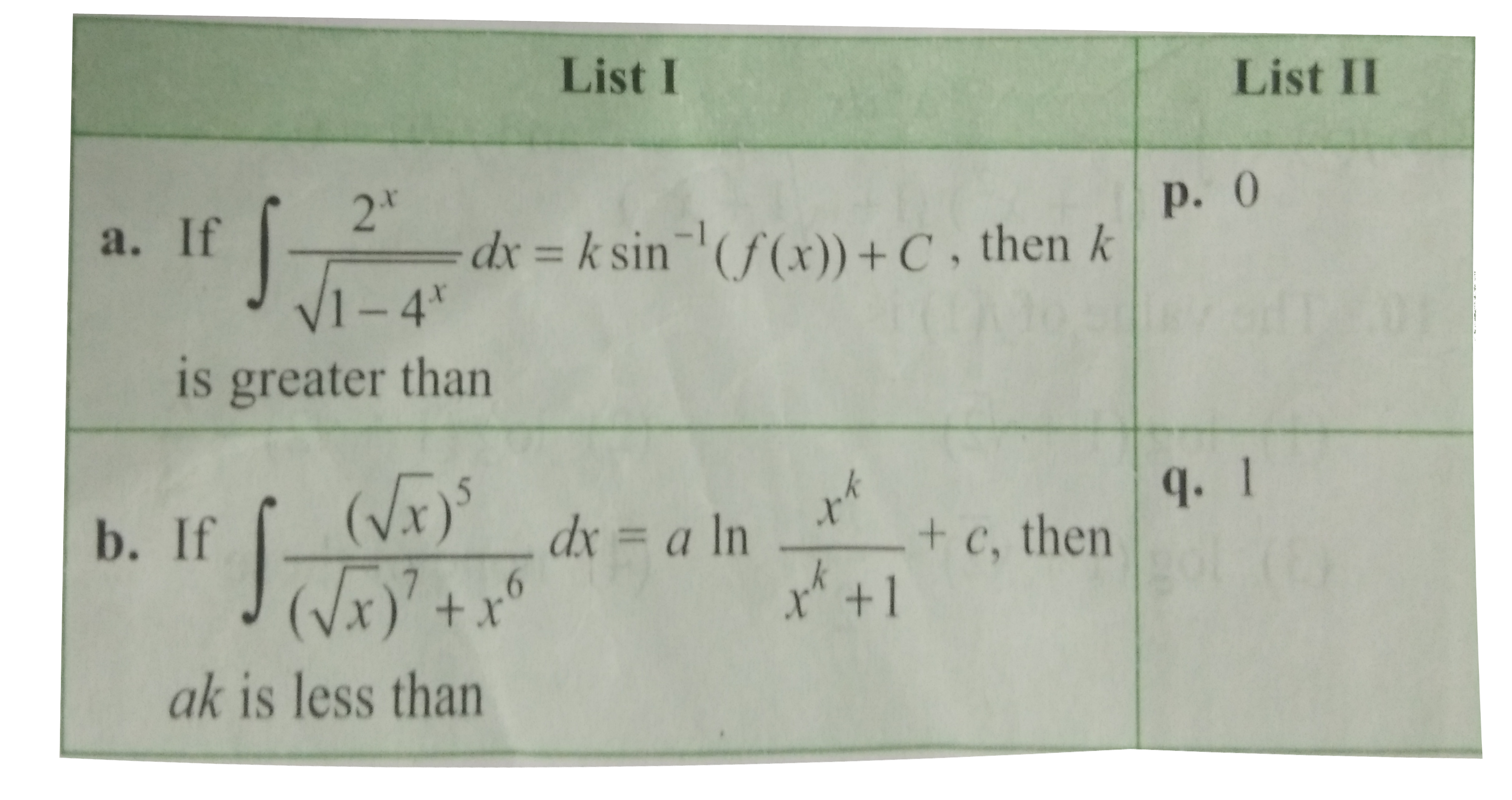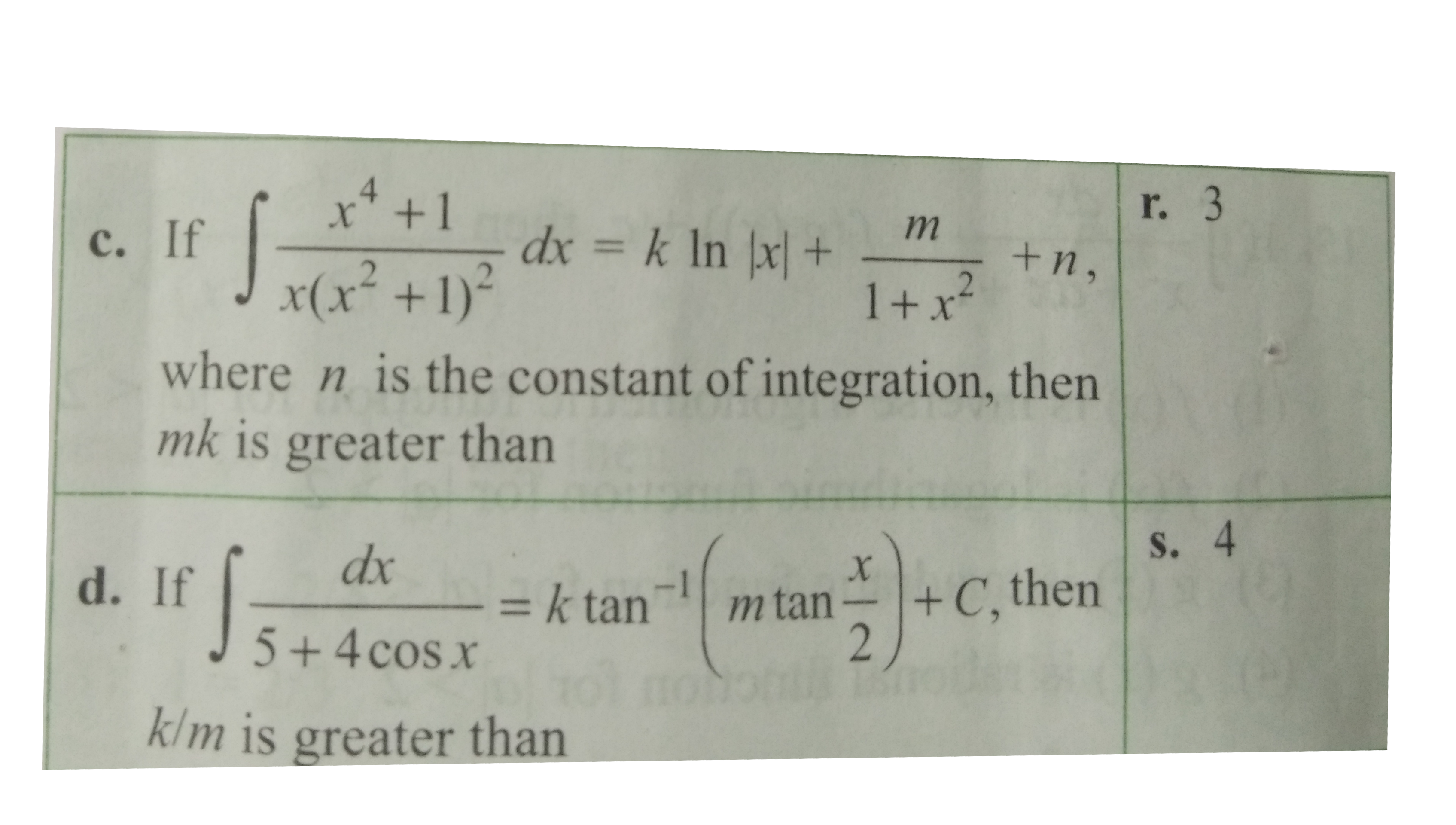Consider two differentiable functions f(x),g(x) satisfying
6∫f(x)g(x)dx=x6+3x4+3x2+cand2∫g(x)dxf(x)=x2+c, where f(x)>0∀x∈R.
limx→0log(f(x))g(x)=Solution in Bengali
e
2
1
0
The correct Answer is:D
We have, 6∫f(x)g(x)dx=x6+3x4+3x2+c
Differentiating both sides w.r.t.x, we get
6f(x)g(x)=6x5+12x3+6x
∴f(x)g(x)=x5+2x3+x ...(1)
2∫g(x)dxf(x)=x2+c
Differentiating both sides w.r.t.x, we get
g(x)f(x)=x ...(2)
Multiplying (1) and (2), we get
(g(x))2=x6+2x4+x2=(x3+x)2
∴g(x)=x3+x
∴f(x)=x2+1 (asf(x)>0).
Now ∫(g(x)−f(x))dx=∫(x3+x−x2−1)dx
=x44+x22−x33−x+c
limx→0log(f(x))g(x)=limx→0log(1+x2)x+x3
=limx→0log(1+x2)x2⋅x2x+x3
=limx→0x1+x2=0
Topper's Solved these Questions
- BOOK - CENGAGE PUBLICATIONCHAPTER - INDEFINITE INTEGRATIONEXERCISE - EXERCISES (Matrix Match Type)4videos
INDEFINITE INTEGRATION
- BOOK - CENGAGE PUBLICATIONCHAPTER - INDEFINITE INTEGRATIONEXERCISE - EXERCISES (Numerical Value Type)10videos
INDEFINITE INTEGRATION
- BOOK - CENGAGE PUBLICATIONCHAPTER - INDEFINITE INTEGRATIONEXERCISE - Exercises (Multiple Correct Answers Type)17videos
INDEFINITE INTEGRATION
- BOOK - CENGAGE PUBLICATIONCHAPTER - HYPERBOLAEXERCISE - COMPREHENSION TYPE2videos
HYPERBOLA
- BOOK - CENGAGE PUBLICATIONCHAPTER - INEQUALITIES AND MODULUSEXERCISE - Single correct Answer21videos
INEQUALITIES AND MODULUS
Similar Questions
Match the following lists:

 03:01View Solution
03:01View SolutionLet f(x)=∫xsinx(1+xcosx.lnx+sinx)dxandf(π2)=π24. Then the value of |cos(f(π))| is____
02:59View SolutionEvaluate:∫dx√2ex−1=
05:25View SolutionThe circle x2+y2−8x=0 and hyperbola x29−y24=1 I intersect at the points A and B. Equation of a common tangent with positive slope to the circle as well as to the hyperbola is (A) 2x−√5y−20=0 (B) 2x−√5y+4=0 (C) 3x−4y+8=0 (D) 4x−3y+4=0
05:57View SolutionIf f(x)=ax2+bx+c and f(−1)≥−4, f(1)≤0 and f(3)≥5, then the least value of a is
06:07View SolutionIf f(x)andg(f) are two differentiable functions and g(x)≠0 , then show that f(x)g(x) is also differentiable ddx{f(x)g(x)}=g(x)ddx{f(x)}−f(x)ddx{g(x)}[g(x)]2
05:39View Solutionint(f(x)*g'(x)-f'(x)g(x))/(f(x)*g(x)){log g(x)-log f(x)}dx
05:39View SolutionConsider two differentiable functions f(x),g(x) satisfying
6∫f(x)g(x)dx=x6+3x4+3x2+cand2∫g(x)dxf(x)=x2+c, where f(x)>0∀x∈R.
∫(g(x)−f(x))dx is equal to04:30View SolutionConsider two differentiable functions f(x),g(x) satisfying
6∫f(x)g(x)dx=x6+3x4+3x2+cand2∫g(x)dxf(x)=x2+c, where f(x)>0∀x∈R.
limx→0log(f(x))g(x)=05:19View SolutionLet f be a differentiable function satisfying f(xy)=f(x).f(y).∀x>0,y>0 and f(1+x)=1+x{1+g(x)}, where limx→0g(x)=0 then ∫f(x)f'(x)dx is equal to
04:26View Solution∫f(x)g'(x)−f'(x)g(x)f(x)g(x)[log(g(x))−log(f(x))]dx=
03:37View Solution∫f(x)g'(x)−f'(x)g(x)f(x)g(x)[log(g(x))−log(f(x))]dx=
03:37View SolutionConsider two differentiable functions f(x),g(x) satisfying
6∫f(x)g(x)dx=x6+3x4+3x2+cand2∫g(x)dxf(x)=x2+c, where f(x)>0∀x∈R.
∫(g(x)−f(x))dx is equal to04:01View SolutionConsider two differentiable functions f(x),g(x) satisfying
6∫f(x)g(x)dx=x6+3x4+3x2+cand2∫g(x)dxf(x)=x2+c, where f(x)>0∀x∈R.
limx→0log(f(x))g(x)=04:16View SolutionIf f(x)andg(f) are two differentiable functions and g(x)≠0 , then show trht f(x)g(x) is also differentiable ddx{f(x)g(x)}=g(x)dx{f(x)}−g(x)dx{g(x)}[g(x)]2
03:45View Solutionf(x+y)=f(x)+f(y),for ∀xandyandf(x)=(2x2+3x)g(x). For ∀x. If g(x) is a continuous function and g(0)= 3 then f'(x) = ……….
05:36View Solution

